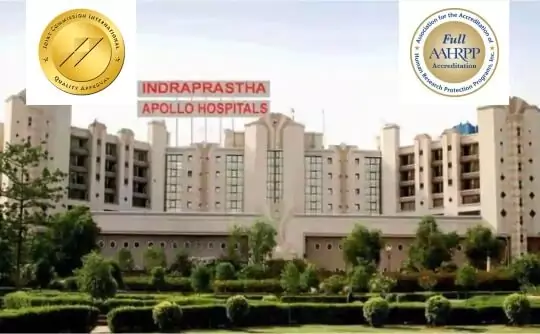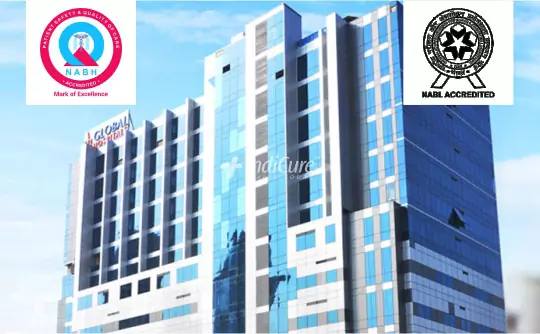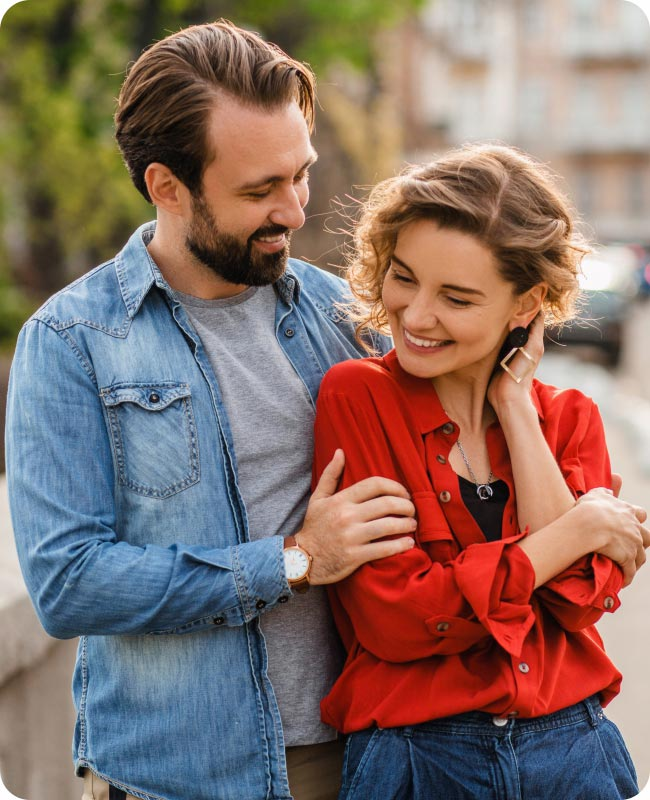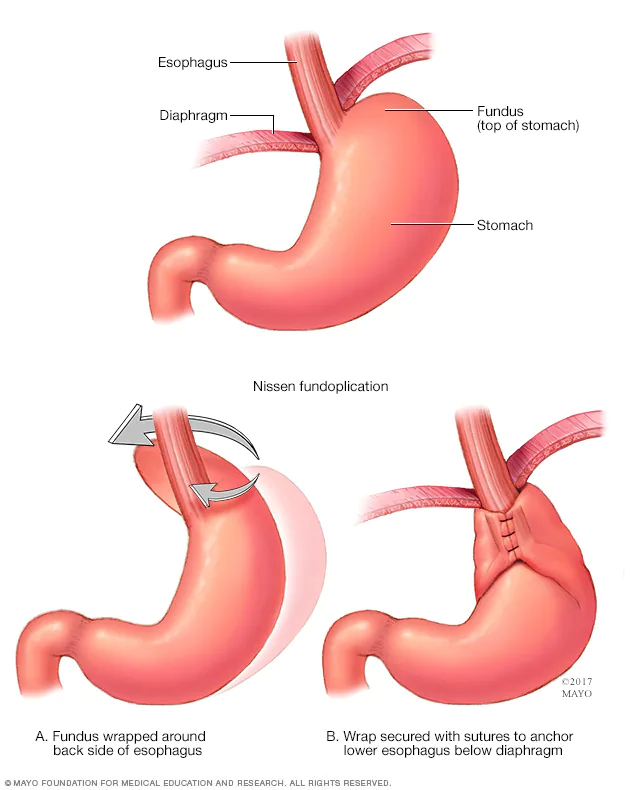

GERD Operation Cost in India starts from US $3,500 and varies depending on the type of surgical approach, your medical history and health condition, surgeon, hospital and the city where you choose to get the surgery done.
A significant portion of the overall cost of the surgery arises from the use of any customized surgical instruments or specialized technology. GERD surgery can be done through open surgery or through laparoscopic instruments which play a major factor in determining the overall cost of GERD surgery.
An important expense when it comes to your GERD treatment is going to be your gastrointestinal surgeon's fees. IndiCure recommends only experienced, skilled, board-certified surgeons who are capable of delivering successful GERD operations. The charges may vary depending on the experience of the surgeon, popularity, and the approach to treatment.
Having your GERD treatment in an accredited surgical facility by skilled and qualified medical staff is a critical factor. Moreover, the geographical location of this facility also affects the initial quote. But, IndiCure provides you with a projected estimate that will be affordable.
The surgery-related expenses include the pre- and post-surgical expenses. The pre-surgical expenses are associated with the candidacy and the medical history of the patient. This also includes the routine medical exams and tests to ensure you're a good fit for the surgery. Post-surgical expenses may include prescription medications and follow-up consultations.
We at IndiCure, understand that you travel with a budget in mind and do not like to be greeted by surprises after arrival in India. We thus club all these expenses and give you the package cost that is inclusive and affordable at the same time.
Your case manager shall give you an estimated cost of your surgery after discussing your medical reports with the surgeon. The final cost, however, shall be confirmed after your consultation with the surgeon.
In fact, we have Special Negotiated Rates with the Hospitals and you can avail Discounted Rates when you choose to Travel with IndiCure.


We Help you Choose the Right Treatment, Surgeon & Hospital

We Arrange Video/Telephonic Consultation with the Surgeon

We Assist you with Visa & Accommodation

We Receive you at the Airport and Drop you at Hotel/Hospital

We Assist you the at Hospital & Provide Post Operative Support

New Delhi
Indraprastha Apollo Hospitals, New Delhi is a state of the art multi speciality tertiary-care hospital situated in the most posh area of South Delhi. Considered to be the flagship hospital of Apollo group, Indraprastha Apollo Hospital is one of the important landmarks not only in Delhi, but in the world map because of its popularity among the medical tourists.

Mumbai
Gleneagles Global hospital in Parel, Mumbai is a 450 bedded multi super-specialty tertiary care hospital housed on 17 floors. It is the latest addition to the geographical footprints of the Gleneagles group in India. The unique feature of the hospital is separate Intensive Care Units for separate specialties viz Post Transplant ICU, Medical ICU, Cardiac ICU, Surgical ICU, Renal ICU.
GERD, also known as Gastro-Esophageal Reflux Disease or Acid Reflux Disorder, refers to the condition characterized by the backflow (reflux) of the stomach content like stomach acid and bile into the oesophagus. The oesophagus is the hollow, muscular organ that carries food and liquids from the throat to the stomach.
Normally, during digestion process, the lower esophageal sphincter (LES) present at the junction of oesophagus and stomach opens to let the food pass into the stomach and closes to block the backflow of the food and stomach acidic juices into the oesophagus. However, in the case of GERD, the reflux occurs due to weak LES or if it works or relaxes in an inappropriate way.
GERD results in esophageal inflammation and thereby an increase of ulcers, narrowing of esophageal stricture or oesophageal cancer.
GERD is always associated with chronic heartburn which is the most common symptom of GERD. Acid regurgitation, which is reflux of gastric acid into the mouth, is the other common symptom. Other less common symptoms are:

The factors that are responsible for causing GERD are;
The 'gold-standard' therapy for treating gastroesophageal reflux disease (GERD) in those who don't respond to drugs or can't take them for other reasons is the Laparoscopic Nissen fundoplication. The top section of the stomach is wrapped around the lower esophageal sphincter (LES) during the Nissen fundoplication to tighten the sphincter, reduce acid reflux, and repair a hiatal hernia. After surgery, most people find a considerable reduction in acid reflux symptoms.
Gastroesophageal reflux disease (GERD) is a digestive system illness affecting the esophagus. If you have GERD, your stomach acid and contents flow back up into your esophagus on a regular basis.
In individuals with GERD, fundoplication basically fixes the valve at the end of the esophagus that isn't working properly. Unlike GERD drugs, surgery prevents all reflux, including digestive enzymes and acid. As a result, unlike drugs, surgery can cure GERD.
The procedure is named after Dr Rudolf Nissen (1896-1981), who described the first fundoplication in the 1950s for treatment of severe reflux esophagitis.
Nissen fundoplication procedure is usually performed laparoscopically. Laparoscopic operations are carried out through small incisions while the physician observes the procedure on a video display. The fundus (the top of the stomach, thus the term fundoplication) is wrapped around the bottom of the esophagus during surgery. A 'wrap' is another word for a fundoplication.
A completed Nissen fundoplication
By Dana Hamers - Own work, CC BY-SA 3.0,
https://commons.wikimedia.org/w/index.php?curid=20453728
Following enlisted are the treatment options for treating GERD and acid reflux;
These include alteration in sleeping habits. Patients are recommended to sleep at night with slightly elevating your upper body as patients experiencing heartburn might have reflux at night. This position is of benefit to avoid the reflux at night.
Encourage smaller and earlier meals in the evening as it results in lesser expansion of the stomach that may reduce the reflux. Some foods and beverages like chocolates, caffeinated drinks, alcoholic beverages, peppermint etc. are responsible for promoting the reflux, and thus should be avoided. Consumption of fatty foods should be reduced. Smoking should be stopped. Spicy and foods containing acids like carbonated beverages, tomato or citrus juice should be avoided.
Following drugs are recommended to lessen the symptoms:
There are various Ayurveda treatment options to cure heartburn. You could simply opt for medications or can choose to stay in a wellness resort/ayurveda hospital to completely get rid of your heartburn and other Gastrointestinal problems.
Following are surgical treatments that aid to relieve and cure the GERD and its symptoms.
This is the standard surgical intervention to tighten and strengthen the LES. In this, the higher part of the stomach is draped around the outer side of the lower part of the esophagus to give strength to LES. This surgery can be done as
If non surgical methods have failed to relieve you of heartburn, or you have any of the following conditions, surgery may be an option for you:
We at IndiCure completely understand your concerns and it is always our endeavor to provide the best outcome for every patient. Following is the list of questions you must ask before you embark on your journey for GERD treatment in India.
Prepare to answer questions about your:

Fundoplication is the most common operation for persistent heartburn. The surgeon can operate on you from the outside using special instruments such as a tiny tube with a light and camera called a laparoscope, or they can directly touch the sections of your body they're working on (open fundoplication).
Your surgeon will make a large cut in your belly for open surgery or a series of minor cuts for laparoscopic surgery. The top half of your stomach will next be wrapped around the bottom part of your esophagus and sewn in place. This helps prevent stomach acid from backing up into the esophagus by tightening it.
A laparoscope is used to place a ring of titanium beads around the outside of your lower esophagus during the LINX surgery. The valve between the esophagus and the stomach is strengthened as a result of this. Food and liquids are still permitted to pass through.
These are usually the initial steps taken by your doctor. A flexible tube called an endoscope will be inserted into your mouth and into your esophagus and stomach. They can look into your body because the tube has a light and a camera. They can also obtain tissue samples and perform surgery using the endoscope and specific instruments.
They can connect the end of the esophagus to the top of the stomach with a collection of small instruments at the end of an endoscope. Alternatively, they could sew pleats in the lower esophagus to reinforce the area.
The doctor uses high-energy waves to generate small amounts of scar tissue in the lower esophagus wall during the Stretta procedure, also known as radiofrequency treatment. Heartburn and other acid reflux symptoms are frequently relieved as a result of this. For a decent result, you may require more than one treatment.
These treatments are frequently effective, albeit they may not be as effective as surgery. They don't, however, necessitate cutting into your stomach, general anesthesia, or a hospital stay.

It's possible that your throat will be sore for a day or two after surgery. You'll require a temporary nasogastric (NG) tube if you or your child undergoes open fundoplication surgery. While you recuperate, the tube clears the stomach of digestive secretions.
You or your child may also require an IV (intravenous) line to keep you hydrated until you are able to eat again. Once you've passed gas or had a bowel movement, you can resume eating. Those acts indicate that your body is resuming its normal function.
Adults and children may need to stay in the hospital for 2-3 days after surgery. The length of recovery varies on whether the surgeon employed a laparoscopic or open method, as well as whether there are any other medical issues.
Laparoscopic surgery allows many patients to return home in a day or two.
Many surgeons prescribe a soft foods diet for the first seven to ten days after surgery. Within a few days of surgery, you should be able to resume normal activities and gentle exercise.
After returning home from the hospital, most children are able to return to school within a few days. For at least three weeks, they should avoid intense exertion. Activity restrictions differ between laparoscopic and open treatments.
You may feel some pain and discomfort for a few days which can be resolved with pain medications. You can resume your daily activities within a week, but heavy work and exercises should wait for 8-10 weeks. Your doctor may advise you to start with a liquid diet and gradually switch to semi solids and then solid food.
The results of Fundoplication surgery for GERD are good. You can expect relief from the acid reflux syndrome. Acid reflux medicines are usually not required after the procedure. Relieving GERD makes you more comfortable and lowers the risk of Barrett's esophagus. Barrett's esophagus increases your chances of getting esophageal cancer.
GERD is a chronic illness. It usually lasts a lifetime once it starts. A persistent condition is esophagitis, which is a damage to the lining of the esophagus. Furthermore, once the esophagus has recovered as a result of treatment, most patients will experience a recurrence of the injury within a few months.
Surgery is usually the last resort to treat GERD. Other non-invasive methods to treat GERD are medications, lifestyle modifications and Ayurveda interventions.
Ayurveda, or ancient Indian medicine, is based on ancient literature that emphasizes a "natural" and holistic approach to physical and mental health. Ayurvedic medicine is one of the world's oldest medical systems, and it is still practiced in India today.
If you have severe GERD issues, surgery may be considered. Stomach acid, for example, can induce esophageal inflammation. It's possible that this will result in bleeding or ulcers. Scars from tissue injury can narrow the esophagus, making it difficult to swallow.
The gold standard for surgical therapy of severe GERD is laparoscopic fundoplication, which has a 95% patient satisfaction rate. Nissen fundoplication is also highly beneficial and has good results.
This procedure normally causes only minor discomfort. The abdomen, as well as the minor incision sites, will be uncomfortable, and some patients will experience shoulder ache for the first few days. Gas remaining in your abdomen during the operation causes shoulder ache.
GERD surgery is a very safe procedure with minimal risks. However, following are some of the issues one could face after the surgery, though the incidence is rare.
You may require 4 to 6 weeks to return to work or your normal schedule after open surgery. You will most likely only remain in the hospital for 2 to 3 days if the laparoscopic procedure is employed. The patient is given a general anesthesia. Because there is no huge incision to heal, you will experience less pain following surgery.
The surgery is relatively safe with morbidity of less than 1%.
Studies have shown that patients rated the overall outcome as outstanding 43 percent, good 38 percent, fair 11 percent, and bad 8 percent. Conclusion- The majority of patients who underwent laparoscopic Nissen's fundoplication had excellent long-term acid reflux control and were satisfied with their decision to have surgery.
We demonstrated a great response rate of 77.1%, with a mean follow-up of 3.7 years. In this study, we found excellent quality of life after Nissen fundoplication. Nissen fundoplication has been proven effective in reducing GERD and preventing recurrence, even at the long-term follow-up.
Source- https://www.ncbi.nlm.nih.gov
Serious side effects from laparoscopic antireflux surgery are uncommon. Like all surgical procedures, fundoplication carries the risk of anesthesia, bleeding and infection.
Side effects are possible, however they usually fade with time. Fundoplication can cause abdominal bloating, but it is rarely severe. Dysphagia (difficulty swallowing) is another side symptom that, in most individuals, improves over time if food is chewed sufficiently. The majority of people can readily belch when they need to, especially when some time has elapsed after surgery.
Laparoscopic Nissen fundoplication has been reported to provide long-term relief for the majority of patients. The surgery enhances quality of life and is preferable to taking medications for the rest of one's life.
Traveling abroad for medical reasons may be challenging. With our experience of over a decade and working with the best surgeons and top hospitals in India, we help make your medical tour easier and safer for you. We will guide you at every step of the way and make end-to-end arrangements for your surgery, travel, and stay.
Ramandeep Dhaliwal
I had great experience having rhinoplasty through Indicure. Dr. Ruchika from Indicure has helped me in finding best plastic surgeon, answering all my questions...
Read More
Joshua Archer
My name is Joshua Archer I'm from New Zealand, bay of plenty, kawerau I opted for the bypass surgery in January 2023 but planned it in advance for 28 September found IndiCure...
Read More
Kera Ren
Absolutely loved my experience with IndiCure - from first inquiring to meeting the surgeon pre op to my follow up post op. The surgeon was extremely approachable...
Read More
Andreana Paul
Had a wonderful experience. Visited India for my plastic surgery. From sending mails, airport pickup, comfortable accommodation and, to smooth hospital appointment booking...
Read More
Brandi Luce
I had the privilege of using Indicure's services for a cosmetic procedure that I had wanted for a long time but had always been apprehensive about. Ruchika helped me...
Read More
Jade M
Indicure Health Tours went above and beyond my expectations. They helped me with every aspect of my journey and were professional, kind and caring. I was...
Read More
The content on the website (www.indicure.com) is intended to be general information and is provided only as a service. All photographs on our website of before and after results are examples only, and do not constitute an implied or any other kind of certainty for the result of surgery.
Learn about IndiCure Health Tours' comprehensive editorial policy that strives to deliver trustworthy, helpful, relevant, accurate and people-first content on medical tourism in India.
It is not medical advice and should not be taken as medical advice. It should not be used to diagnose or treat a health condition and is in no way meant to be a substitute for professional medical care. You are advised to see a surgeon in person to assess what surgery may or may not accomplish for you.
It is also important to keep your expectations realistic and to understand that all surgical procedures carry risks and should never be taken lightly.